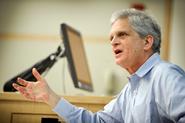
Ambassador Edward S. Walker Jr. ’62, the Christian A. Johnson Distinguished Professor of Global Political Theory, has returned to the Hill this semester to teach a course on Cultural Diplomacy: Tool of Diplomacy or Imperialism (Government 341.)
Ambassador Walker’s 35-year career in the Foreign Service includes ambassadorships in Israel, Egypt, the United Arab Emirates and at the U.N. where he held the position of deputy permanent representative of the U.S. Walker’s political career includes time spent as assistant secretary of state for Near Eastern Affairs under Madeline Albright during the second Clinton administration as well as under Colin Powell at the very beginning of the Bush administration.
The course focuses on how culture is used by the United States and other countries to achieve foreign policy goals. Some countries use cultural diplomacy to make up for military and economic weakness with some success. A primary question raised in the course is whether the U.S. has relied too heavily on its military and economic power, and too little on “soft power” and cultural diplomacy, causing us to be less effective in achieving our foreign policy goals. Cultural diplomacy requires a long-term perspective and constant effort, which some observers believe is lacking in U.S. diplomatic practice. The course is based on the academic literature on the role of cultural diplomacy in foreign policy and on Walker’s own experience in the Foreign Service.
Walker believes that cultural diplomacy is an important subject because so many people ignore it. He says that “people teach and think of foreign policy as a function of power: your military power, your economic power, and your assistance power. And what they seldom think about is you have to gear our approach to another country by understanding their culture and what’s going to be an effective approach…So I think if we ignore that we have really different cultures, it impacts the way we interpret events. That can cause friction between our societies, which is unnecessary. Then we’re not using our power to the fullest extent.”
Walker currently divides his time between Hamilton College and Washington, D.C., where he is an adjunct scholar, and former president of the Middle East Institute.
He explains that his time in D.C. is vital to the teaching of cultural diplomacy. Because this subject is concerned not only with history, but also with current events, time spent in D.C. is the best way to keep up with new developments. After all, the goal of the course is to capture not only what is going on in the Middle East and throughout the world, but also the underlying causes of these events.
Walker says that many of the skills he learned at Hamilton were invaluable to his career in the Foreign Service. He points out that the emphasis on writing gave him a leg up in his early career by teaching him to write succinctly. In addition, he points to a few classes he took with a visiting professor from Cairo University on Sufism and Islamic philosophy. At the time, he thought it was just for fun.
When asked the best way to affect cultural perceptions of America in the Middle East, Walker said that America is struggling to find the best use of soft power and often puts it off as an issue of public diplomacy. He states that it is “not public diplomacy but basic political understanding.” It is essential to understand other countries and their leaders and relate to them in a way that shows that we have their interests in mind. In essence, we need to send these countries a different message.
Walker’s personal experience in the Foreign Service is a source of excitement to the class. When asked why they wanted to take the course, many of his students said that above all, they valued his “on the ground opinion” of how foreign relations works. World politics major Catherine Hee ’14 commented that she took the course because it was one of the best at Hamilton on the Middle East, her area of focus. In contrast, Joe Anderson ’13 remarked that he took the course because he wanted to fully understand the role culture plays in international relations.
However, Kevin Tutasig ’13 sums up the general feeling of the class best when he proclaims, “As a student who aspires to work for the Foreign Service, to be taught by a former Ambassador is truly a privilege. Ambassador Walker’s lectures on diplomacy, as well as his personal experience working for the State Department are inspiring.”
Posted November 14, 2012
